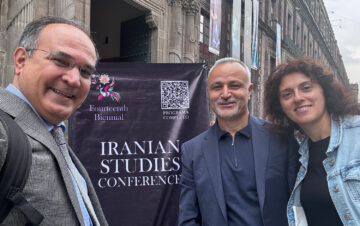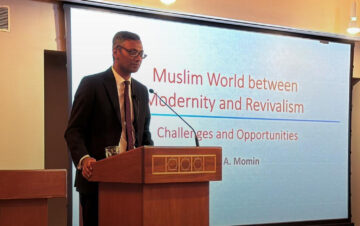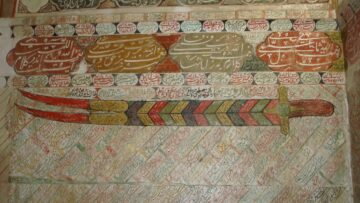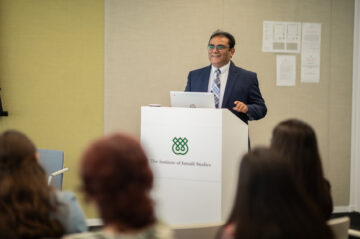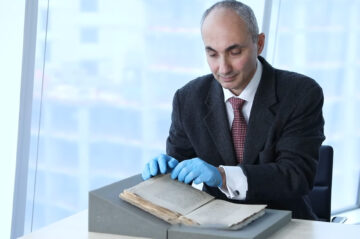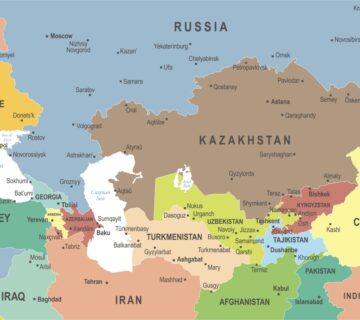The Second World Congress for Middle Eastern Studies (WOCMES-2), hosted by the Royal Institute for Inter-Faith Studies in Amman, Jordan on 11-16 June 2006, brought together scholars from diverse fields within the humanities and social sciences from around the world to exchange research and ideas. Among the 1,250 presentations, there were papers by 3 individuals affiliated with The Institute of Ismaili Studies (IIS) – Dr Ali Qutbuddin, Yahia Bayza and Sabrina A. Bandali.
WOCMES-2 is unique in being the first major academic event on Middle Eastern Studies that took place in the Middle East, providing a greater opportunity for scholars from North Africa and Asia, including the Middle East, to participate along with specialists from North America and Europe.
Featuring numerous academic panels and roundtable discussions by an international committee, WOCMES-2 hosted over 1,300 participants from 78 countries. Keynote speakers at the conference included El Hasan Bin Talal, Chairman and Board of Trustees of the Royal Institute of Inter-Faith Studies (RIIFS), Professor Gunter Meyer, President of the International Council of WOCMES, Richard W. Buillet, Professor of Middle Eastern Studies at Columbia University, and Riaz Hassan, Australian Research Council Professorial Fellow and Emeritus Professor at the Flinders University. The WOCMES Award for Outstanding Contribution to Middle Eastern Studies was awarded to the renowned social historian, Andre Raymond.
‘Al-Mu‘ayyad al-Shirazi’s Refutation of the ‘Mulid’ Ibn al-Rawandi’ was the topic of the paper presented by Dr Ali Qutbuddin, a Visiting Research Fellow at the IIS, as part of a panel on “Islamic Philosophical Approaches.” Dr. Qutbuddin discussed al-Mu‘ayyad’s refutation of al-Rawandi’s ideas negating prophecy both as a source of knowledge, emphasising the independence of the human intellect, and as a source of law, emphasising the ability of human reason to distinguish between right and wrong, something akin to Kant’s moral imperative. Dr Qutbuddin further questioned the accuracy of statements by Stroumsa and other thinkers in which they glorify al-Rawandi as a ‘freethinker’. He explained that al-Rawandi promoted an ideology in the same way as other scholars such as al-Ghazali and al-Farabi.
Yahia Baiza, a PhD student and alumni of The Institute of Ismaili Studies, presented two papers at WOCMES-2. In his first paper, ‘Education in Afghanistan: Challenges of Reforming a Post-war Education System’, Yahia discussed the present state of education and the challenges of reforming a post-war education system in Afghanistan where the bulk of the infrastructure has been destroyed, human capacity is underdeveloped, and the education system has limited facilities to offer any appropriate services.
In his second paper, ‘Rethinking Madrassa Education: The Progress and Weakening of an Education System with Reference to the Case of Afghanistan’, Yahia explained how the madrassa education system developed as an independent model of learning in Afghanistan and the wider Muslim world, and the influence madrassa schools have in the education systems around the Muslim world. He also examined how various issues, including Mihna (the great inquisition), war, and the teachings of various revivalist movements, have played a role in the degradation of madrassa education.
Sabrina A. Bandali, now entering her second year as a student of the Graduate Programme in Islamic Studies and Humanities (GPISH), presented a paper entitled, “Islam Past and Present: The Problem of Intercalation”, which was part of a panel on “Diversity in Early Islamic Traditions”. Her paper investigated the impact of the perceived Qur’anic prohibition of intercalation, that is, the practice of synchronising the lunar months with the solar year, and its impact on the social solidarity and identity of the emerging Muslim community.
This was the second WOCMES event to date; the first was held in Mainz, Germany and was a joint congress of the European Association for Middle Eastern Studies (EURAMES) and the German, British, French and Italian Middle Eastern Studies associations. Last year, WOCMES involved scholars and academics from 52 countries, and included over 400 panels, workshops and exhibitions comprising 1,115 individual presentations.

